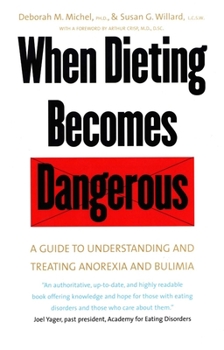When Dieting Becomes Dangerous: A Guide to Understanding and Treating Anorexia and Bulimia
Select Format
Select Condition 
Book Overview
This primer on anorexia and bulimia is aimed directly at patients and the people who care about them. Written in simple, straightforward language by two experts in the field, it describes the symptoms and warning signs of eating disorders, explains their presumed causes and complexities, and suggests effective treatments. The book includes: - guidance about what to expect and look for in the assessment and treatment process;
- emphasis on the critical role of psychotherapy and family therapy in recovery;
- explanation of how anorexia and bulimia differ in their origins and manifestations;
- information on males with eating disorders and how they are similar to and different from female patients;
- a separate chapter for health care professionals who are not specialists in the diagnosis and treatment of individuals with eating disorders;
- up-to-date readings, Internet sites, and professional organizations in the United States and in Europe.
- emphasis on the critical role of psychotherapy and family therapy in recovery;
- explanation of how anorexia and bulimia differ in their origins and manifestations;
- information on males with eating disorders and how they are similar to and different from female patients;
- a separate chapter for health care professionals who are not specialists in the diagnosis and treatment of individuals with eating disorders;
- up-to-date readings, Internet sites, and professional organizations in the United States and in Europe.
Format:Paperback
Language:English
ISBN:0300092334
ISBN13:9780300092332
Release Date:January 2002
Publisher:Yale University Press
Length:176 Pages
Weight:0.50 lbs.
Dimensions:0.5" x 8.6" x 8.8"
Customer Reviews
2 ratings
A pithy gem
Published by Thriftbooks.com User , 20 years ago
Deborah Michel and Susan Willard have drawn from their wealth of experience treating patients in one of the most enduring and effective inpatient eating disorders programs to create a concise introduction to anorexia nervosa and bulimia. When Dieting Becomes Dangerous is written plainly enough to provide a working knowledge of eating disorders to patients and families while going into sufficient depth to give treating professionals a valuable resource. It provides an elegant model of the treatment team, clearly defining the roles of each member as the team deals with both the target behaviors and the underlying struggle to create an enduring sense of self beyond the limits of body image. Richard A. Moskovitz, MD, author of Carousel Music and Lost in the Mirror, 2nd Edition: An Inside Look at Borderline Personality Disorder
Ignorance is dangerous too
Published by Thriftbooks.com User , 21 years ago
This small book by Michel and Willard is one of the best and most accessible pieces of writing I have read about eating disorders. Without the hype and drama that the conditions usually inspire, the authors discuss calmly and thoughtfully the possible root causes of anorexia and bulimia as well as the route to recovery. There were several items in this book that I found useful - one was the comprehensive discussion of the ideal team approach to treating the disorders. The role of the dietitian is particularly interesting - I had never thought of the possibility that someone with an eating disorder would need a professional with that training not just for information about eating healthfully but to give the patient an outlet for his or her obsessive concerns about food, so that therapy could address other issues. Along those lines, Michel and Willard highlight the roles that other health professionals, such as dentists, can play in identifying and treating eating disorders. This is a must read for any health professional who might ever encounter someone with an eating disorder and not be sure of what to do. I also welcomed the discussion of the male patterns with respect to eating disorders - very often we categorize these as female problems and overlook the fact that boys and men can and do suffer from them, albeit in slightly different proportions and manners. I think this is also one of the few texts that discusses the role of the family without implicitly blaming family members for what has happened - and that is valuable to all concerned. All in all, a good read - quick and informative - and essential for anyone who has an eating disorder or knows someone who does.






